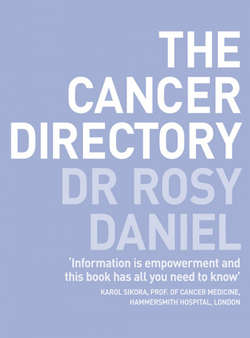Читать книгу The Cancer Directory - Dr. Daniel Rosy - Страница 76
Understanding the treatment offered
ОглавлениеBefore you commit to a particular treatment, be sure you understand both the benefits and side-effects that you may experience.
Quite often, because people are so anxious about what the treatment will do in the short term, they do not really hear or take on board what is being said about long-term side-effects. For example, a woman asking about chemotherapy treatment may be thinking about its effects on her hair, nails and energy levels, and whether she will be able to work and look after her children. She may completely miss the fact that, in the longer term, the chemo could cause infertility, depression or nerve damage.
While thinking about the possibility that tamoxifen treatment for breast cancer may cause weight gain, a woman may miss the point that it also carries a 5–10 per cent risk of causing endometrial cancer. Clearly, doctors and other healthcare professionals do not like to dwell on the downsides of treatment but, as mentioned earlier, it is better to be aware of and prepared for the worst-case scenario than having it sprung on you at a later date, facing you with a new set of losses and fears. It may be worthwhile having two separate discussions with your doctors or nurses – one about the short-term effects of the treatment and a blow-by-blow account of receiving the treatment; and another about the possible or likely long-term side-effects of the treatment.
A useful source of information about drug treatments is the drug information centre found in most big hospitals. This is usually staffed by helpful pharmacists, who will take the time to answer your questions or send you printed material about the medicines you are being offered. Pharmacists are far more knowledgeable about drugs and treatments than doctors and other healthcare professionals, and will have detailed information sheets and research data for each medicine being offered at their fingertips. If you do not have access to a big hospital, you can still speak to the pharmacist responsible for the oncology ward who will often be only too pleased to share his or her knowledge and experience with you.
